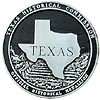| |
|
|
Greer County, Texas |
|
 |
|
IH 40, rest stop on OK border, Shamrock,
TX,
USA
Latitude & Longitude:
35° 13' 33.30064999992",
-100° 2' 11.4244400004"
|
| |
| |
|
Texas State
Historical Marker |
Created 1860; until 1896, one of largest counties in Texas. Organized at Old Mobeetie, northwest of here. In 1880s settlement was rapid; by 1892 nearly 2,500 pupils were in county's schools. A post office, jail and many houses were built, and over 60,000 cattle grazed the 3,480 square miles of the county's area. But for a half-century (1846-1896) the United States and Texas waged a heated dispute over Greer County. Controversy had origin in an 1819 treaty fixing the line between United States and Spanish territory. A map designating the Red River and 100th meridian as boundary lines was part of treaty; but map aroused dispute, for it incorrectly marked 100th meridian and showed only one fork of two-forked Red River. Texas claimed the North Fork and meridian shown on map defined territory, and legislation and occupancy by Texans decided sovereignty. United States contended South Fork (larger of the two) and true 100th meridian marked boundaries. Three joint survey commissions failed to settle the issue. The U.S. Supreme Court in 1896 ruled that the region was in 1819 part of the Union and thus, was actually part of Oklahoma. Named for John A. Greer, Senator, Secretary of State, Republic of Texas; Lieutenant Governor, 1847-1853. (1967)
This page last updated: 7/15/2008 |
Greer County, Texas Historical Marker Location Map, Shamrock, Texas
|
|
|
|


